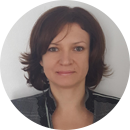
-

-
Session A. Stratospheric ozone science
"Polar Stratospheric Ozone: Recent Observations, Current Understanding, and Future Evolution"
Ulrike Langematz
(Institute of Meteorology, Freie Universität Berlin, Germany) -
-
- Biography
-
Ulrike Langematz is a professor and the Director of the Atmospheric Dynamics Working Group at the Institute of Meteorology at Freie Universität Berlin. She received her Ph.D. degree (1991) in Natural Science at Freie Universität Berlin and had been Postdoctoral Fellow in the Stratospheric Research Group, Institut für Meteorologie, Freie Universität Berlin. She has been PI and member of several national and international research projects. She was a Chapter Lead Author on the 2010 and 2018 WMO/UNEP scientific assessments of ozone depletion. She was Vice-President of the IUGG-International Commission of the Atmosphere (ICMA), and a member of the SPARC-Working group on stratospheric temperature trends. Her research interests include dynamics, radiation and chemistry of the middle atmosphere, stratospheric ozone, stratosphere-troposphere coupling, past and future climate change, ozone, and solar impact on climate.
-
-
-

-
Session A. Stratospheric ozone science
"Understanding Changes in Tropical and Mid-latitude Stratospheric Ozone"
Neil Harris
(Centre for Environment and Agricultural Informatics, Cranfield University, United Kingdom) -
-
- Biography
-
Neil Harris is Professor of Atmospheric Informatics at Cranfield University. He obtained his B.S. degree in chemistry from Oxford University and Ph.D. degree (1989) in Chemistry at the University of California in Irvine. He joined the European Ozone Research Coordination Unit in Cambridge, where he was a NERC Advanced Research Fellow in the Dept of Chemistry until March 2016. He was awarded the NERC 50th anniversary International and the Overall Impact Awards for our role in successful development of the Montreal Protocol on Substances that Deplete the Ozone Layer. He was a Chapter Lead Author on the 1994 and 2014 WMO/UNEP ozone assessments and is a co-editor of Atmospheric Chemistry and Physics. He is co-chair of the Stratosphere-troposphere Processes and their Role in Climate of the World Climate Research Programme and has been involved in many international assessments of ozone depletion and climate change. His research interests include measurements of atmospheric halocarbons, the Tropical Tropopause Layer and emissions of trace gases as well as analyses of ozone trends.
-
-
-

-
Session B. Ozone-depleting substances, sources, sinks, and budgets
"Long-term Observations of Ozone-Depleting Substances and Their Substitutes from a Regional Background Site in East Asia"
Sunyoung Park
(Kyungpook National University, Republic of Korea) -
-
- Biography
-
Sunyoung Park is professor of department of oceanography at Kyungpook National University. She obtained B.S. degree (1995) and M.S. degree (1997) from Seoul National University and Ph.D. degree (2005) in University of California, Berkeley. Her research interests are the biogeochemical cycles of the major greenhouse gases (GHGs), focusing on sources, sinks, and source/sink distributions of these gases, and the chemistry related to their formation and destruction. Her recent research topics also emphasize man-made halogenated compounds (CFCs, HCFCs, HFCs, and PFCs) - stratospheric ozone-depleting substances and/or GHGs by suggesting a significant increase in the emissions of most halocarbons in East Asia.
-
-
-

-
Session C. Tropospheric ozone science
"Ozone Pollution and Research Program in China: An Overview"
Yuanhang Zhang
(Peking University, China) -
-
- Biography
-
Yuanhang Zhang is professor of Peking University at China. He graduated from Peking University with B.S. degree (1982) and M.S. degree (1985) in Technical Physics. He received the Ph.D. degree (1990) from Center for Environmental Sciences, Peking University and had been Post Doctoral Fellow in Environmental Department, the Netherlands Energy Research Foundation for two years (1993-1995). He was Associate Professor, Director of the Division of Atmospheric Chemistry, Center for Environmental Sciences, Peking University (1995-1996) and Professor, Director (1996-2002). In addition, He was Committee member of Science and Technology, Ministry of Environment Protection, China, Vice-Chairman, Chinese Society of Environmental Sciences (2006) and Vice Chair, UNEP ABC-Asia Science Team (2009). His research interests include atmospheric chemistry, urban and regional air quality, air pollution and climate change.
-
-
-

-
Session D. Ozone, Climate, and Meteorology
"The Impacts of Ozone on Climate Across Timescales"
Amanda Maycock
(Institute for Atmospheric and Climate Science (ICAS), University of Leeds, United Kingdom) -
-
- Biography
-
Amanda Maycock is Associate Professor in Climate Dynamics of Institute for Atmospheric and Climate Science (ICAS), University of Leeds. She graduated from University of Manchester, with B.S. degree (2006). She received the M.S. degree (2008) and Ph.D. (2011) degree from Atmosphere, Oceans and Climate, University of Reading. She had been Post Doctoral Fellow in National Centre for Atmospheric Science, University of Cambridge. Her research interests include climate science, climate change, climate modelling, midlatitude dynamics, tropical widening, Stratosphere-troposphere interactions, and ozone layer.
-
-
-

-
Session E. Ozone monitoring and measurement techniques
"Ozone Monitoring and Measurement Techniques"
Natalya Kramarova
(NASA, Goddard Space Flight Center, Greenbelt, Maryland, USA) -
-
- Biography
-
Natalya Kramarova is a research scientist at the Atmospheric Chemistry and Dynamics Lab in NASA Goddard Space Flight Center (GSFC). She received her M.S. degree (2000) in physics and later a Ph.D. degree (2007) in Physics and Mathematics from Moscow State University, Russia. She worked on developing a radiative transfer algorithm and studying long-term ozone variability. In 2010-2017 Dr. Kramarova worked for Science Systems and Applications Inc. at NASA GSFC, characterizing ozone profile retrievals from NASA’s UV sensors (SBUV, OMPS). In January 2018 she joined NASA GSFC. Dr. Kramarova is a member of the OMPS (Ozone Mapping and Profiler Suite) Science Team. She is working on improvements for the ozone profile retrieval algorithm and on characterization of the retrieval errors.
-
-
-

-
Session F. Environmental and human health effects of atmospheric ozone and UV
"Mapping Global Ground-Level Ozone Concentrations for 1990 to 2017 to Support Health Impact Assessment"
Jason West
(Department of Environmental Sciences and Engineering, University of North Carolina, Chapel Hill, North Carolina, USA) -
-
- Biography
-
Dr. J. Jason West conducts interdisciplinary research addressing air pollution and climate change by using models of atmospheric chemistry and transport and tools for quantitative policy analysis. His work aims to understand the relationships between air pollution and climate change and their relevance for science and policy on local through global scales.
Using computer models, Dr. West is currently exploring the effects of changes in emissions on global air quality (ozone and particulate matter), the international transport of air pollutants, the health effects of air pollution, the effects of climate change on air quality and the radiative forcing of climate.
Recently, Dr. West led the first study of the co-benefits of greenhouse gas (GHG) mitigation for air quality and human health to use global atmospheric models and future scenarios; results showed that the monetized co-benefits exceeded previous co-benefits estimates and exceeded the global costs of GHG mitigation through 2050.
EDUCATION
PhD, Civil and Environmental Engineering / Engineering and Public Policy, Carnegie Mellon University, 1998
MPhil, Environment and Development (Geography), University of Cambridge, 1995
MS, Civil and Environmental Engineering, Carnegie Mellon University, 1994
BSE (with honors), Civil and Environmental Engineering, Duke University, 1993
RESEARCH ACTIVITIES
Global climate change; air pollution; atmospheric modeling; ozone; fine particulate matter; human health impact assessment; risk assessment;
quantitative policy analysis; radiative climate forcing; long-range air pollutant transport
-
-


